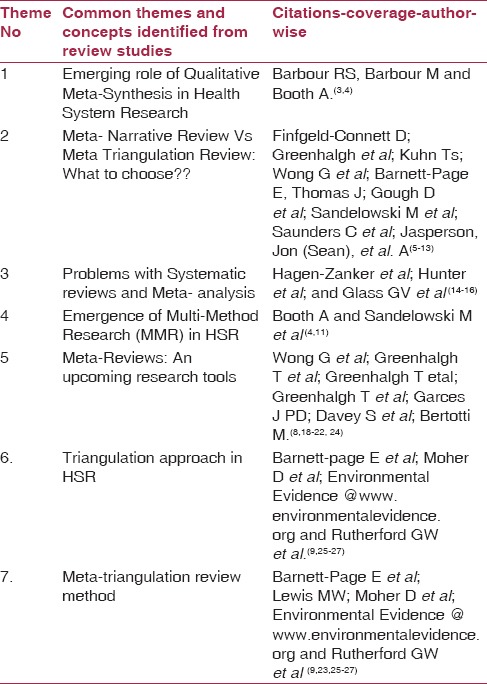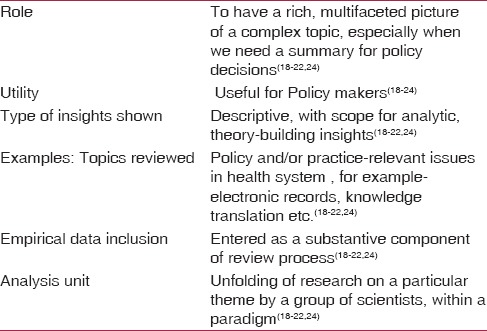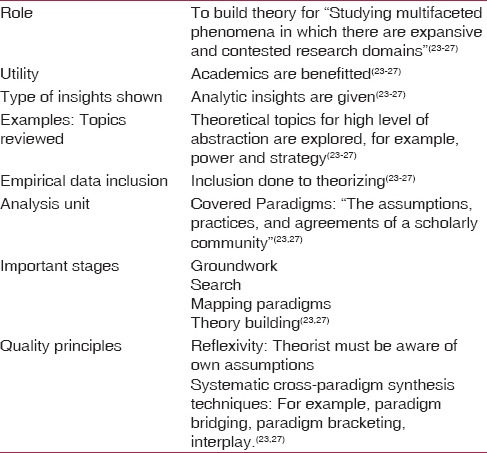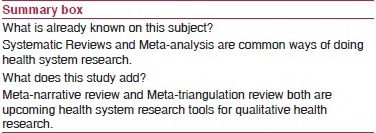Abstract
Two new approaches in systematic reviewing i.e. Meta-narrative review(MNR) (which a health researcher can use for topics which are differently conceptualized and studied by different types of researchers for policy decisions) and Meta-triangulation review(MTR) (done to build theory for studying multifaceted phenomena characterized by expansive and contested research domains) are ready for penetration in an arena of health system research. So critical look at which approach in Meta-review is better i.e. Meta-narrative review or Meta-triangulation review, can give new insights to a health system researcher. A systematic review on 2 key words-“meta-narrative review” and “meta-triangulation review” in health system research, were searched from key search engines, such as Pubmed, Cochrane library, Bio-med Central and Google Scholar etc till 21st March 2014 since last 20 years. Studies from both developed and developing world were included in any form and scope to draw final conclusions. However unpublished data from thesis was not included in systematic review. Meta-narrative review is a type of systematic review which can be used for a wide range of topics and questions involving making judgments and inferences in public health. On the other hand Meta-triangulation review is a three-phased, qualitative meta-analysis process which can be used to explore variations in the assumptions of alternative paradigms, gain insights into these multiple paradigms at one point of time and addresses emerging themes and the resulting theories.
Keywords: Meta-narrative review (MNR), Meta-triangulation review (MTR), health system research (HSR)
Background
We must not forget the fact that, the field of secondary research is now growing very fastly. Various approaches of systematic review, each with a power and potential in different situations has been described for a researcher.(1) But all public health researchers know very well that meta-analysis; for purposes of identifying patterns among study results focuses in contrasting and combining results from different studies, sources of disagreement among those results. It also takes out interesting relationships among multiple studies by way of identification of a common measure of effect size, i.e. weighted average of the output of the studies.(2) Therefore, Meta-analyses are usually an important part of a systematic review procedure as they can be done on several clinical trials of a medical treatment to get a better understanding of how well the treatment can work in public health setting.
In meta reviews, Meta Narrative Review (MNR) and Meta Traingulation Review (MTR) are new upcoming field in health system research, so they can be explored further. Therefore authors have explored this area via critical systematic review on these new tools for their role in health system research.
Materials and Methods
Study designs used
Previous systematic reviews and exploratory research on role of MNR and MTR in HSR is the main study design considered.
Methodology
Systematic review on two key words: “meta-narrative review (MNR) and meta-triangulation review (MTR) in HSR” was done from main search engines, that is, PubMed, Cochrane library, Biomed Central, and Google Scholar, etc., in all forms till 21st March 2014 since last 20 years. From 50 articles which were searched, 27 articles finally met the inclusion criteria. This study is unique in sense that, as only very few authors has performed systematic review in this related area.
Inclusion criteria
Studies from both developed and developing world were included; of any kind, on role of MNR and MTR in HSR.
Exclusion criteria
Unpublished data from thesis/dissertation was not taken on both these reviews.
Results
The summary of results of this systematic review are given in Table 1 as given below; for the emerging common themes and concepts from this systematic review.
Table 1.
Common themes identified from systematic review of literature

Theme 01: Emerging role of Qualitative Meta-Synthesis in health system research
The growing popularity of qualitative approach in health system research is now compelling its proper incorporation into the evidence based research in health system.(3) Meta-synthesis, the so called “science of summing up” is now becoming a building block in public health in its two approach i.e. meta-analysis as quantitative approach and meta-ethnography as qualitative approach.(3,4) Utility of these approaches has been described to make decisions on the massive and increasing volume of research evidence.(3,4) Therefore they are placed as building blocks for research required in a specific area of health system by “finding, evaluating and synthesizing evidence from research studies”.(3,4) Evidence based practice in public health is therefore looking beyond the established models of research synthesis for innovative approaches, but still a lot of work needs to be done in developing and applying these appropriate methodologies for health system research.(3,4)
Under the umbrella of methodological pluralism, multi method synthesis of the literature is knocking the door of research, especially in areas of nursing research and evidence-based medicine(3,4) These methodologically different approaches are one of the ideal tools found in the field of healthcare Information Technology (IT) researchers, who understand both the complexity of the healthcare domain and increasingly sophisticated inter-organizational multi-actor usage of healthcare information systems.(3,4) Also research synthesis now used for management and organization studies in health system consisting of a combination of narrative synthesis, meta-ethnographic, meta-narrative, and realist approaches.(3,4) The Interpretive Synthesis [IS] field also includes a meta-triangulation approach, which is a form of qualitative meta-analysis.(3,4)
Theme 02: Meta- Narrative Review Vs Meta Triangulation Review: What to choose??
Meta-Narrative Review Approach
The Meta Narrative Review (MTR) approach is used as a synonym for meta-narrative synthesis. Meta synthesis is the way of combining qualitative results from different investigations for use in clinical practice and health policy formulation.(5) It has recently been developed in order to synthesize heterogeneous research literature on a complex topic as described by Greenhalgh et al.(6) This method not only allows us, to tease out a number of different streams of research at one point of time, but also show how seminal books and papers in each tradition has inspired programmes of theory building and empirical research. At the same time it has also proved to compare and contrast these traditions in a structured way systematically to identify the distorted concepts and flawed reasoning in them.(6)
Kuhn's notion has applied scientific paradigms to map the meta-narratives (over-arching storylines) of research as they had unfolded in different research traditions. Thus revealing how ‘normal science on topic has been differently defined and explored by different groups of scholars over time.(6,7) New approaches are now available to carry out Mixed Method Literature Reviews (MMLR) which include qualitative and quantitative evidence and can also identify the mechanisms by which the programs reach their goal.(8,9,10,11)
Meta-Triangulation Review Approach
Meta-Triangulation Review (MTR) is a type of qualitative meta-analysis that helps researchers to recognize, cultivate, and accommodate diverse paradigmatic insights. It is in fact “a strategy of applying typical diversity to foster greater insight and creativity”.(12) In one study by Jasperson JS for relationships between power and IT by meta-paradigmatic approach helped authors to understand, delimit, and carefully describe the conceptualization of power that they are adopting when studying IT.(13) At a deeper level meta-paradigmatic approach helped them to surface anomalies and paradoxes, the process of reconciling these anomalies and paradoxes, thus allowing the researchers to build and test richer theories of complex relationships.(13)
Theme 03: Problems with Systematic reviews and Meta- analysis
Systematic reviews are considered one of the strongest form of medical evidence. But in a review of 300 studies, it was found that not all systematic reviews were reliable, and their reporting can be improved only by a universally agreed standards and guidelines.(14) Even in meta- analysis approach; there are many problems like meta-analysis of several small studies does not predict the results of a single large study.(15) Sources of bias are not controlled by meta analysis method. Moreover, a good meta-analysis of badly designed studies can result in a bad statistics i.e. only methodologically sound studies should be included in a meta-analysis, a practice called as ‘best evidence synthesis’.(16)
Theme 04: Emergence of Multi-Method Research (MMR) in HSR
Although MMR covers many types of methods under its umbrella ranging from: Qualitative/quantitative to empirical/synthesis types, but mainly focus on use of qualitative approach. One of the emerging method under MMR is Methodologically Inclusive Research Synthesis (MIRS). It includes various methods like meta-ethnography, meta-synthesis, meta-study, qualitative meta-analysis, qualitative synthesis, aggregated analysis, and synthesis of qualitative research.(4,11) Greenhalgh et al had described use of MMR approach in review of electronic patient records.(6) It was published in a health policy journal and only seven of the health-related references from over 100 studies reviewed were from Association for Information System Top Basket journals.
Theme 05: Meta Narrative Reviews (MNR): An upcoming research tools
Meta-reviews of MNR variety basically look historically at how particular research traditions or epistemic traditions have unfolded over a period of time and shaped the ‘normal science’ of a topic area. MNR has ability to show how heterogeneous topic areas can have contrasting and complementary paths at the same time. Thus, it highlights the strengths and limitations of different research approaches in the topic.(17) MNR is used where topics/questions involves making judgments and inferences rather than checking against or following a technical checklist. But it is not possible to be prescriptive of what may be done in a review.
The method of MNR was developed in 2004 & 2005 in response to challenges which emerged in a review on diffusion of service-level in healthcare innovations.(6,18) Recently RAMESES (Realist And Meta-narrative Evidence Syntheses: Evolving Standards) project has given training materials and quality standards for the use of MNR.(8,19) 6 guiding principles and 3 phases of MNR has been mentioned by various authors in their studies and their key features are shown in Table 2.(18,19,20,21,22) Six guiding principles are:
Table 2.
Key features of a meta-narrative review

Principle of pragmatism;
Principle of pluralism;
Principle of historicity;
Principle of contestation;
Principle of reflexivity;
Principle of peer review.
Three phases of MNR are:
Planning phase;
Search phase;
Mapping and inclusion phase.
Thus, MNR has potential to add value to the synthesis of heterogeneous bodies of literature, in which different groups of scientists have conceptualized and investigated the ‘same’ problem in different ways and produced seemingly contradictory findings.(20) Key features of meta-narrative review as found from many studies are given in Table 2 given above.(18,19,21,22,24)
Theme 06: Triangulation approach in Health System Research
Triangulation method in HSR is based on the laws of trigonometry to determine the location of the fixed point. These laws state that if one side and two angles of a triangle are known, the other two sides and angle of that triangle can be calculated. So, “Triangulation” is an approach to synthesizing multiple, diverse sources of data at the level of interpretation.
Theme 07: Meta-Triangulation Review (MTR) method
MTR is a theory-building process that assists researchers in recognizing, cultivating, and accommodating diverse paradigmatic insights. It is used to articulate the paradigms underlying extant theory and to derive richer theoretical bases for understanding the phenomenon being studied.(23,25,26,27) Meta-triangulation review is considered similar to evidence mapping & realist critical interpretive synthesis which summarizes:
How do we get to where we are &
What we need to do next.
It demands critical interpretive synthesis to build theory that explains observations.(23,25,26,27)
The meta triangulation process actually consists of a three-phased model (groundwork, data analysis, and theory building) to explore variations in the assumptions of alternative paradigms as shown in Table 3.(13,23) Four other types of triangulation approaches useful in HSR apart from MTR are suggested by Rutherford W et al (27):
Table 3.
Key features of a meta-triangulation review

Data triangulation: Data gathered through different samples and at different times are compared;
Investigator triangulation: More than one investigator examines the same question and results are compared;
Theory triangulation: Different theoretical constructs are applied to the same observed data and
Method triangulation: Phenomena are examined using different methods
Although the main goal of triangulation approach is to inform public health decisions, but it can also be used to assess the external validity of observed trends as well as to examine the effectiveness of widely disseminated interventions on multiple outcomes such as knowledge, attitudes, behaviors and actual disease incidence at the population level, which can also be served by meta-triangulation approach.
Limitations of MNR and MTR
MNR — here confusion often prevails among researchers, journal editors, peer reviewers and funders regarding a high quality meta-narrative review.(18,19,20,21,22,25) Meta-narrative reviews are infact not ‘linear’ reviews. A general rule is that, if a recommended item is excluded from the write-up of a meta-narrative review, a justification must be given. Some meta-narrative reviews are not flagged in the title and/or they are inconsistently indexed, so they are difficult to locate in searches.(18,19,20,21,22,25)
MTR — It does not formally demonstrate causality in the same manner as a purposefully designed randomized controlled trial but rather offers a rational explanation or interpretation of the data at the other hand. Therefore, MTR on should not displace formal evaluation of interventions, carefully constructed surveillance systems or formal monitoring and evaluation activities.(26,27)

Conclusions
Since many systematic reviews are designed to inform policy and practice in health system research, it is important to select a method/type that can produce the kind of conclusions needed by a health system researcher. But this is not always simple or even possible to achieve in practice. Both MNR and MTR are a new research method that has been developed to synthesize diverse types of literature with an ability to identify the ‘story lines of research’ within and across disciplinary boundaries e.g. sociology, psychology, health system, geography etc in a systematic way.
Meta-narrative review (synthesis) approach elucidates the fact that research can and should be assessed for its quality. It also enables us to identify meta-narratives of each discipline and to analyze the different ‘discourses’ and languages of ‘community’. On the other hand, the meta-triangulation review approach offer an opportunity to compare and contrast the data generated by these activities with the end of improving public health outcomes. Meta-triangulation is found to be now an excellent tool for understanding theoretical perspectives in MIS research. Therefore, further research is still required on these upcoming field if we want to use, both these tools in public health research commonly as both types of tools have their advantages as per requirements in health system research. So, we offer this systematic-review as a preliminary contribution to the debate on this area, not as the last word on it.
Footnotes
Source of Support: Nil
Conflict of Interest: None declared.
References
- 1.Potts HW. Meta-narrative review. Presented at: 5th ESRC Research Methods Festival, Oxford. 2012 [Google Scholar]
- 2.Greenland S, O’Rourke K. Meta-Analysis. In: Rothman KJ, Greenland S, Lash T, editors. Modern Epidemiology. 3rd ed. Philadelphia: Lippincott Williams and Wilkins; 2008. p. 652. [Google Scholar]
- 3.Barbour RS, Barbour M. Evaluating and synthesizing qualitative research: The need to develop a distinctive approach. J Eval Clin Pract. 2003;9:179–86. doi: 10.1046/j.1365-2753.2003.00371.x. [DOI] [PubMed] [Google Scholar]
- 4.Booth A. Cochrane or cock-eyed? how should we conduct systematic reviews of qualitative research?[Paper presented at the Qualitative Evidence-based Practice Conference, Taking a Critical Stance. Coventry University] 2001:14–16. [Google Scholar]
- 5.Finfgeld-Connett D. Generalizability and transferability of meta-synthesis research findings. J Adv Nurs. 2010;66:246–54. doi: 10.1111/j.1365-2648.2009.05250.x. [DOI] [PubMed] [Google Scholar]
- 6.Greenhalgh T, Potts WW, Wong G, Bark P, Swinglehurst D. Tensions and paradoxes in electronic patient record research [A systematic literature review using the meta-narrative method]. Research Report [UK NHS SDO Programme, Medical Research Council, Department of Health] 2005 doi: 10.1111/j.1468-0009.2009.00578.x. [DOI] [PMC free article] [PubMed] [Google Scholar]
- 7.Kuhn TS. Chicago: University of Chicago Press; 1962. The structure of scientific revolutions. [Google Scholar]
- 8.Wong G, Greenhalgh T, Westhorp G, Buckingham J, Pawson R. RAMESES publication standards: Meta-narrative reviews. BMC Med. 2013;11:20. doi: 10.1186/1741-7015-11-20. [DOI] [PMC free article] [PubMed] [Google Scholar]
- 9.Barnett-Page E, Thomas J. Methods for the synthesis of qualitative research: A critical review. BMC Med Res Methodol. 2009;9:59. doi: 10.1186/1471-2288-9-59. [DOI] [PMC free article] [PubMed] [Google Scholar]
- 10.Gough D, Thomas J, Oliver S. Clarifying differences between review designs and methods. Syst Rev. 2012;1:28. doi: 10.1186/2046-4053-1-28. [DOI] [PMC free article] [PubMed] [Google Scholar]
- 11.Sandelowski M, Voils CI, Leeman J, Crandell JL. Mapping the mixed methods-mixed research synthesis terrain. J Mixed Method Res. 2012;6:317–31. doi: 10.1177/1558689811427913. [DOI] [PMC free article] [PubMed] [Google Scholar]
- 12.Saunders C, Carte AT, Butler BS. Lessons from the Trenches of Meta-triangulation Research. Commun Assoc Inf Syst. 2003;11:245–70. [Google Scholar]
- 13.Jasperson JS, Carte T.A, Saunders C.S, Butler B.S, Croes H.J.P, Zheng W. Review: Power and information technology research: A meta-triangulation review. MIS Q. 2002;26:397–459. [Google Scholar]
- 14.Hagen-Zanker J, Duvendack M, Mallett R, Slater R, Carpenter S, Tromme M. Making systematic reviews work for international development research. Overseas Development Institute. 2012 [Google Scholar]
- 15.Hunter JL, Schmidt FL, Jackson GB, John E. Meta-analysis: Cumulating research findings across studies. Beverly Hills; Sage. 1982 [Google Scholar]
- 16.Glass GV, McGaw B, Smith ML. Meta-analysis in social research. Beverly Hills; Sage. 1981 [Google Scholar]
- 17.Mays N, Pope C, Popay J. Systematically reviewing qualitative and quantitative evidence to inform management and policy-making in the health field. J Health Serv Res Policy. 2005;10:6–20. doi: 10.1258/1355819054308576. [DOI] [PubMed] [Google Scholar]
- 18.Greenhalgh T, Robert G, Macfarlane F, Bate P, Kyriakidou O. Diffusion of innovations in service organisations: Systematic literature review and recommendations for future research. Milbank Q. 2004;82:581–629. doi: 10.1111/j.0887-378X.2004.00325.x. [DOI] [PMC free article] [PubMed] [Google Scholar]
- 19.Greenhalgh T, Wong G, Westhorp G, Pawson R. Protocol - realist and meta-narrative evidence synthesis: Evolving standards (RAMESES) BMC Med Res Methodol. 2011;11:115. doi: 10.1186/1471-2288-11-115. [DOI] [PMC free article] [PubMed] [Google Scholar]
- 20.Greenhalgh T, Robert G, Macfarlane F, Bate P, Kyriakidou O, Peacock R. Storylines of research in diffusion of innovation: A meta-narrative approach to systematic review. Soc Sci Med. 2005;61:417–30. doi: 10.1016/j.socscimed.2004.12.001. [DOI] [PubMed] [Google Scholar]
- 21.Garces J PD. Eliciting patient perspective in patient-centered outcomes research: A meta narrative systematic review. Mayo Clin. 2012:1–163. [Google Scholar]
- 22.Davey S, Davey A, Singh J. Meta narrative review: Current status and opportunities for public health research. Int J Health Syst Disaster Manage. 2013;1:59–63. [Google Scholar]
- 23.Lewis MW, Grimes AJ. Meta-triangulation: Building theory from multiple paradigms. Acad Manage Rev. 1999;24:672–90. [Google Scholar]
- 24.Bertotti M, Jamal F, Harden A, Sheridan K, Guewara GB, Atim L. Wellbeing and regeneration project: A meta-narrative review of conceptualizations and meanings of ‘community’ within and across research traditions. 2011:1–31. [Google Scholar]
- 25.Moher D, Tetzlaff J, Tricco AC, Sampson M, Altman DG. Epidemiology and reporting characteristics of systematic reviews. PLoS Med. 2007;4:e78. doi: 10.1371/journal.pmed.0040078. [DOI] [PMC free article] [PubMed] [Google Scholar]
- 26.Environmental Evidence. [Internet] c2013. [Last accessed on 2013 Jul 01, Last cited on 2013 Jul 17]. Available from: http://www.environmentalevidence.org .
- 27.Rutherford GW, McFarland W, Spindler H, White K, Patel SV, Aberle-Grasse J. Public health triangulation: Approach and application to synthesizing data to understand national and local HIV epidemics. BMC Public Health. 2010;10:447. doi: 10.1186/1471-2458-10-447. [DOI] [PMC free article] [PubMed] [Google Scholar]


